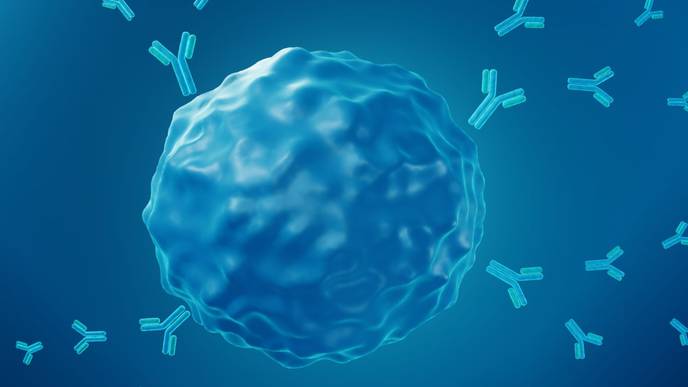A New Tool in the Arsenal Against COVID-19 Is Being Put to the Test

02/14/2023
image: One of the newly discovered class 6 antibodies (blue) attaching to the SARS-CoV-2 spike protein (green) in a way that causes the spike to break upview more
Credit: Garvan / David Langley
A new class of SARS-CoV-2 antibodies has been shown to neutralise multiple variants of the virus, providing hope for a better antiviral medication to prevent and treat COVID-19 symptoms in at-risk individuals, according to a new study from the Garvan Institute of Medical Research.
Monoclonal antibodies are lab-made copies of proteins, used before or after infection to mimic and boost the body’s own immune response to a virus, particularly for people with chronic illness or immunodeficiency. Unlike the five previously known classes of SARS-CoV-2 antibodies, which have limited effectiveness as it wanes with new variants, these class 6 antibodies work by attaching to a partially hidden part of the virus’ spike protein that would be difficult for it to mutate.
The research, published in the journal Nature Communications, shows that the class 6 antibodies effectively neutralise SARS-CoV-2 variants of concern, including Delta and Omicron strains.
“This is a new mechanism of action we’re seeing with these class 6 antibodies,” says Professor Daniel Christ, Director of the Antibody Therapeutics Lab at Garvan and corresponding author of the paper.
“Our hypothesis is that they’re so effective because the area we’re targeting is close to the centre of the spike’s structure. When the antibody attaches there, it distorts the spike and rips it apart. It would be very difficult for the virus to adapt to that,” he says.
The researchers are currently testing the antibodies against more recent strains of SARS-CoV-2, such as XB.1.5 and XBF. If results are promising, they will form the basis for phase 1 clinical trials in 12 to 18 months.
“Almost all commercially available antibodies for COVID-19 don’t work well anymore. Most are class 1 or 2, which refers to the fact that they bind to the most obvious spot on the spike protein – the ACE2 receptor binding site. They have downsides, including failure against new variants as they evolve,” says Dr Jake Henry, Research Assistant at Garvan and co-first author of the paper.
“We’re delighted our research could lead to new antiviral therapy providing reliable ‘passive immunity’ to at-risk individuals.”
New discovery method could fast-track development of antibody therapies for other viral illnesses
The new antibodies were initially discovered in small numbers in samples from patients in Sydney who were infected with the original Wuhan strain of COVID-19.
The Garvan researchers, in collaboration with clinical partners and a multi-disciplinary team across other research institutes, used an innovative approach combining a series of cutting-edge mapping and engineering techniques, to study the blood samples and control the interaction between these therapeutic antibodies and the pathogens they target.
The team sorted and isolated B cells, identifying receptors that would bind in an unusual zone of the spike protein. They analysed the molecular structure of the antibodies produced by these B cells – important because it is their precise shape that determines where – and how – they will react against a viral invader.
“The exciting thing is that we describe a method we can use in the future to apply to other viruses – like flu or coronaviruses. This is a very quick way of identifying and isolating rare antibodies from recovering patients which leads to more effective treatment,” says Dr Henry.
This research was carried out in collaboration with the UNSW Kirby Institute, the Victor Chang Cardiac Research Institute Innovation Centre, the Centenary Institute, NSW Health Pathology, the Electron Microscope Unit at UNSW Sydney and the University of Wollongong Cryogenic Electron Microscopy Facility at Molecular Horizons.
--ENDS--
This research was supported by the National Health and Medical Research Council and the Medical Research Future Fund.
Professor Daniel Christ is a Conjoint Professor, St Vincent's Clinical School, UNSW Medicine and Health and Director of the Centre for Targeted Therapy.
Dr Jake Henry is a Conjoint Lecturer at St Vincent's Clinical School, UNSW Medicine and Health.
Journal
Nature Communications
Method of Research
Experimental study
Subject of Research
Human tissue samples
Article Title
Broadly neutralizing SARS-CoV-2 antibodies through epitope-based selection from convalescent patients
Article Publication Date
10-Feb-2023
Disclaimer: AAAS and EurekAlert! are not responsible for the accuracy of news releases posted to EurekAlert! by contributing institutions or for the use of any information through the EurekAlert system.

Facebook Comments